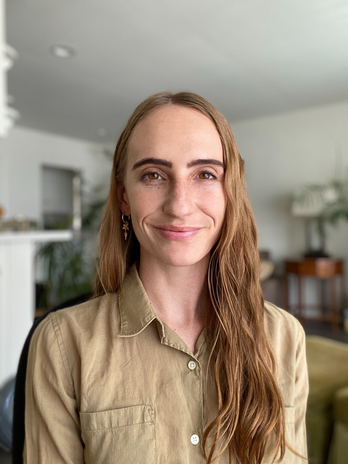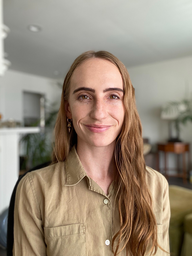Licensed therapist and mental health advocate Sage Grazer is working to transform the world of mental health by building her own mental wellness platform, Frame. With her diverse background and experience, Grazer tackles stigma around mental health while also working to increase accessibility to therapy. Her Campus at UCLA spoke with Grazer to learn about Frame and about Grazer’s passion for mental health advocacy.

Her Campus: Can you tell us a little about yourself?
Sage Grazer: I’m Sage Grazer and I am a licensed therapist here in Los Angeles and co-founder and Chief Clinical Officer of Frame. I co-founded Frame with a childhood friend of mine, Kendall Bird, with the vision of making it easier for people to access therapy, by leveraging technology to streamline the process of connecting with a therapist. As a therapist myself, I was able to advocate for the therapist user experience and provide direct input, based on my own experience and the experience of my colleagues, to make the platform more empowering to therapists.
HC: How did you begin your journey and involvement with mental health?
SG: Growing up with a sibling on the Autism Spectrum, I’ve had awareness of mental health issues, witnessed the benefits of early intervention treatments and experienced the stigma around mental health. Supporting mental health advocacy has always been an important value in my family. For me personally, going to therapy has been an important part of my life since I was a teenager. My early positive experience in therapy led me to pursue a career as a therapist myself. I transitioned to working in the mental health field in 2012 and received my Master of Social Work from NYU in 2014. I’ve worked as a therapist in many different healthcare settings including outpatient clinics, non-profits, after-school programs for at risk youth, residential group home for adolescents and private practice.
HC: What are some things you have learned from being a licensed therapist?
SG: Through my clinical work, I’ve learned a lot more about communication and how to better express myself with the significant people in my life. Something that I continue to remind myself and my clients is that if we don’t communicate our needs, we’re not giving our counterpart (whether that’s your friend, romantic partner or your family member) a chance to meet the need.
HC: Why is mental health advocacy so important to you?
SG: As I mentioned, supporting advocacy and mental health awareness has always been an important value in my life. Mental health (wellness and illness) exists on a spectrum and we all have our moments of feeling overwhelmed in some way. I believe it would be a fair statement to say that everyone is impacted by mental health in some capacity so combating the stigma around mental illness and making it easier to access help feels really important to me. Prior to Frame, I’d dedicated my career to helping people that are struggling with their mental health on one to one basis as a licensed therapist (Licensed Clinical Social Worker). Now, with Frame, I’m also able to help people in a different capacity by facilitating streamlined connections with therapists and providing free resources like our Frame Discussions.

HC: Can you describe Frame? How does it work?
SG: Frame is a mental wellness platform that provides two core services. First, there’s the therapy matching service for people looking to find a therapist within CA (but particularly based out of Los Angeles), where you can create a profile and match with a therapist to begin your own therapy journey. We launched our therapy matching services for the greater Los Angeles area but our therapists are qualified to provide therapy to anyone within the state of California, which has been especially helpful with the use of Telehealth during this pandemic. Secondly, we offer free live and recorded Discussions, which are therapist-led discussions with a volunteer participant and give you a glimpse into what therapy could look like. Our Discussions also serve to educate people on what goes on in therapy, decrease stigma around mental health, and leave viewers with actionable tools to put into use immediately. Some of the mental wellness and personal growth topics that we have covered in live Discussions include Coping With Heartbreak, The Importance of Self Care and the Emotional Impacts of Racial Injustice.
HC: Why did you decide to build this startup?
SG: After reconnecting with my childhood friend and tech and marketing expert, Kendall Bird, and commiserating about the barriers that people face when they are seeking help and looking to find a therapist, we decided to team up to build a platform that offered a better solution to both clients and therapists. With my experience knowing first hand the barriers that therapists face when building their own private practices and Kendall’s expertise and entrepreneurial spirit, we built a platform that is intended to make therapy more accessible and offer different ways to engage in personal growth like our Discussions.
As a therapist, it’s not uncommon to feel like a fish out of water when it comes to building your business and marketing yourself. In school and clinical training, therapists are not usually taught business management and marketing skills and so often start their private practice feeling overwhelmed by the process. I wanted to create a platform that allowed therapists to fully focus on their clinical work rather than stressing about how to niche market their practice.
Frame is an ideal tool for therapists just starting out because it provides a handful of essential practice management tools and a way to grow your client base. Even for seasoned therapists, running a private practice is a business that is always in fluctuation as clients come and go (for positive reasons too), so getting pre-screened new client referrals saves time.
HC: What is Frame’s mission statement?
SG: Frame is a mental wellness platform on a mission to change the way people think about and access therapy. We want to help people understand how addressing your mental health is vital to living a fulfilling life, having meaningful relationships and living up to your potential.

SG: Right now, Frame’s therapy matching service is currently only available within California and particularly for those in and around Los Angeles. We’re hoping to expand to other parts of the nation soon to be able to help therapists and clients across the country.
HC: What tips or advice would you give to college students?
SG: It can be easy to feel consumed by negative thoughts and disappointments in life, especially when things that you’ve looked forward to are no longer taking place and life is filled with so much uncertainty. My advice is to try a therapeutic technique that I use in my practice, resourcing, to help navigate stress and persisting feelings of distress. Resourcing is identifying things in your life that are uplifting, calming, or enjoyable as a way to connect to internal sensations of wellbeing that are pleasant or neutral. In the same way that your brain can’t tell the difference between real and imagined dangers (hence why we may have a threat response or feel panicky just thinking about something triggering), your brain and body will respond accordingly to imagined pleasant thoughts or memories.
Finding “positive resources,” which can be a memory or thought of a person, place, thing, or activity, brings feelings of positivity or neutrality. Sometimes when you are highly distressed it can be too challenging to identify something positive, so I recommend thinking about something neutral, which can also be relieving. You can ask yourself: what is one thing that doesn’t suck or feel bad right now? And then allow yourself to fully flesh out that thought/memory in your mind and envision yourself in that moment, allowing yourself to imagine being in the calming or pleasant sensations that your memory evokes. For example, a positive resource could be a memory of your childhood pet that brings a smile to your face. As you picture that pet, notice what you are sensing in your body and shift your focus to tap into pleasant or neutral sensations
My other quick tips would be: Be kind to yourself and others. Take things one day at a time; we don’t know what the future holds so emotionally investing in imagined worst case scenarios will likely only make you feel worse. Remind yourself of what you appreciate in life and name the things that you are grateful for. Express gratitude to people you interact with on the day to day.
Grazer’s work for the world of mental health is so important. Especially during the pandemic, at a time of isolation, accessibility to therapy and resources is incredibly helpful. We are looking forward to see where Grazer and Frame go in the future!


